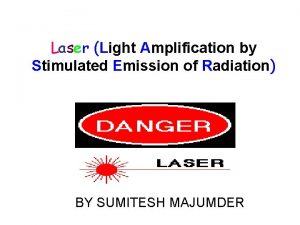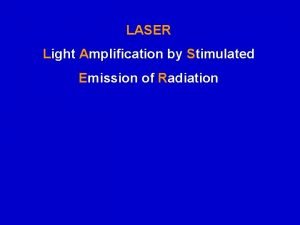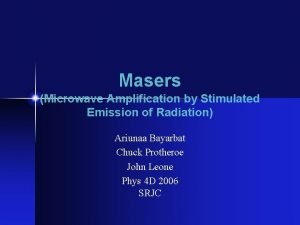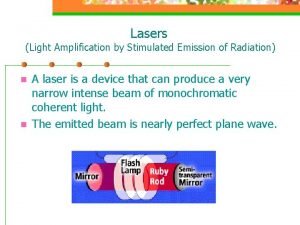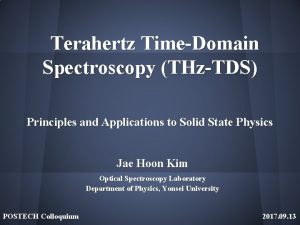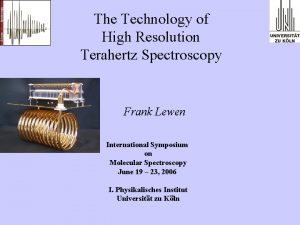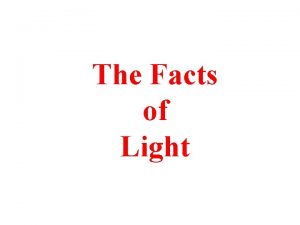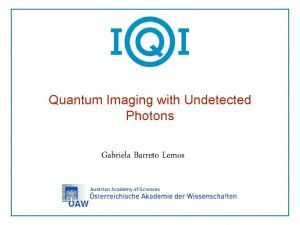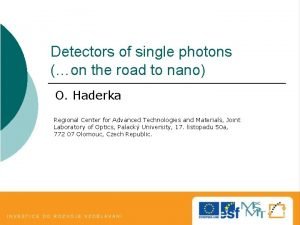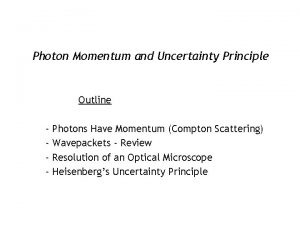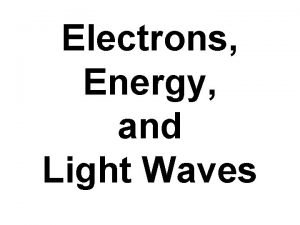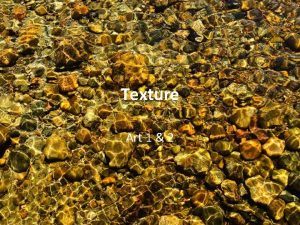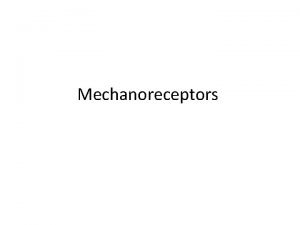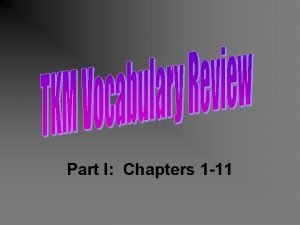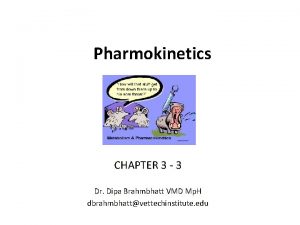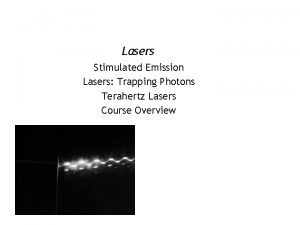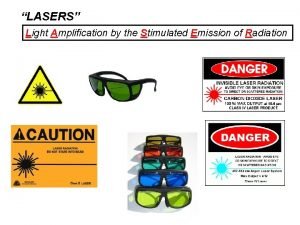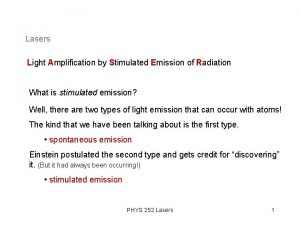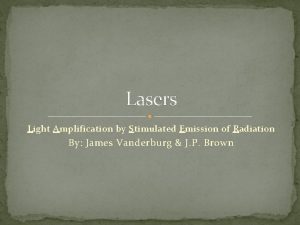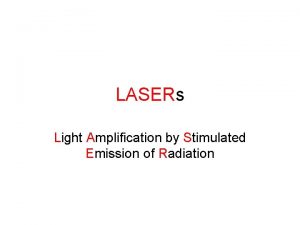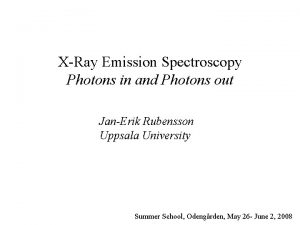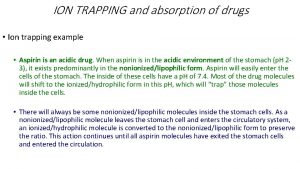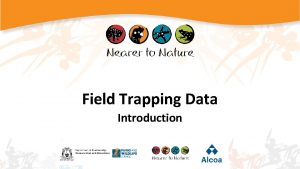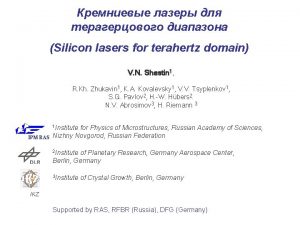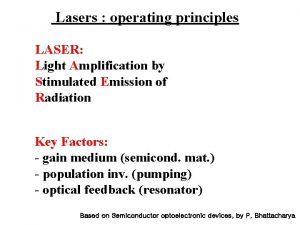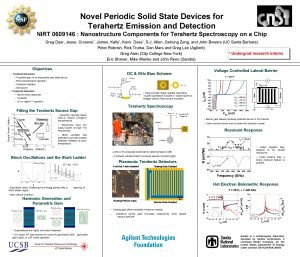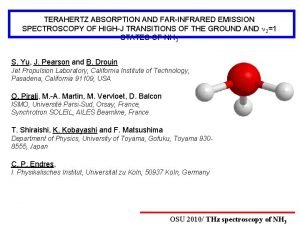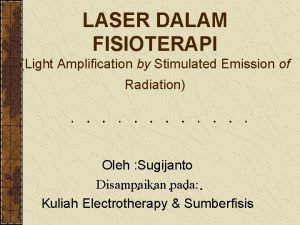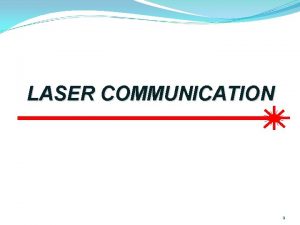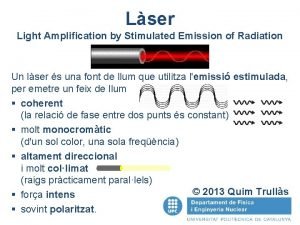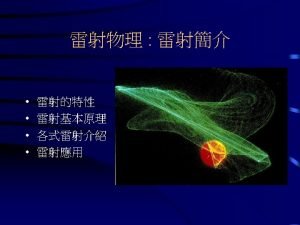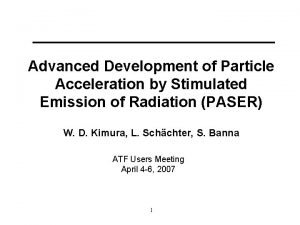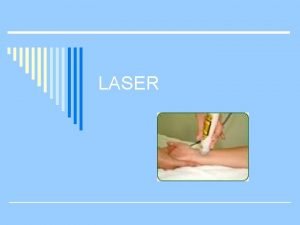Lasers Stimulated Emission Lasers Trapping Photons Terahertz Lasers























- Slides: 23

Lasers Stimulated Emission Lasers: Trapping Photons Terahertz Lasers Course Overview

P-N Junctions and LEDs Emitted Light Beams Terminal Pins Diode Transparent Plastic Case High energy electrons (n-type) fall into low energy holes (p-type)

Energy Conservation Wstored = _____ Wheat Wlight Welectrical

Energy Conservation Wstored = _____ Wlight

Through and Across Variables Wstored = electron energy Wheat Wlight Welectrical THROUGH ELECTRICAL LIGHT ACROSS

Atomic Transitions r 2 p 1 s photon

Light Emission from Magnets Maxwell’s Equations couple H and E fields. . Image in the Public Domain Radiation was missing from our quasi-static approximation http: //juluribk. com/2010/01/14/ radiation-from-dipole/ Courtesy of Bala Krishna Juluri and Sophocles Orfanidis. Used with permission.

Light Emission from Magnets high energy Superposition state = oscillating magnet external field low energy Images in the Public Domain

Solar Cells and Photodetectors r 2 p 1 s Emission photon Classical: Oscillating electric field drives charge oscillation Quantum: Electric field creates superposition of energy states – which have an oscillating charge density

Reverse Absorption: Stimulated Emission ABSORPTION STIMULATED EMISSION How do you choose the color, direction, and phase of the generated photon ? GENERATED PHOTON IS AN EXACT DUPLICATE OF THE INCOMING PHOTON

Quantum Mechanics and Stimulated Emission Pauli Exclusion and electrons (fermions) ‘Two is a crowd !’ Stimulated emission and photons (bosons) ‘The More the Merrier !’ boson also boson fermion! Fermion also boson Boson boson ! also boson FERMIONS GO TO DIFFERENT STATES Boson fermion BOSONS PREFER TO BE IN THE SAME STATE

Quantum Mechanics and Stimulated Emission 1 0. 8 0. 6 + x E (z, t) 0. 4 0. 2 0 -0. 2 -0. 4 -0. 6 -0. 8 -1 0 0. 5 1 1. 5 2 2. 5 z/ l 0 3 3. 5 4 4. 5 5

Lasers The astounding phenomenon is “Stimulated Emission” – a purely quantum phenomenon ! Identical photons with the same frequency moving in the same direction – Result is a coherent light source with a highly directional beam ! Stimulated Emission: If one photon is present it is more likely that an atom will emit a second identical photon! In a laser there is a cascade that causes emission of many identical photons! Photon emitted by some other atom Two identical photons!

Semiconductor Lasers All images are in the public domain

Active Devices for DVD Players 2 -axis Device ¼ Wave Plate Collimator Lens Cylindrical Lens Detector Polarizing Prism Diffraction Grating Laser strained QW at 655 nm All images are in the public domain

Quantum Well Lasers n-type semiconductor CONDUCTION BAND METAL CONTACT p-type semiconductor electron METAL CONTACT VALENCE BAND NARROW GAP ACTIVE REGION V hole

Trapping Photons: Mirrors and Waveguides How do we keep photons around for long enough time so they have a chance to stimulate an emission ? also boson Boson boson ! Boson resonators waveguides

Longest Wavelength Semiconductor Lasers Conduction Band INTERBAND LASER: § set by bandgap § Bipolar: electron-hole recombination § Opposite band dispersion Valence Band INTERSUBBAND LASER: § chosen by design § Unipolar: electrons make intraband transitions § Same subband dispersion Conduction Band

Quantum-Cascade Lasers (slide courtesy of Prof. Jerome Faist at Univ. Neuchâtel) Courtesy of Jerome Faist. Used with permission. Cascade: N repetitions of a period 1 electron traveling through this structure may generate N photons Groupe de physique mésoscopique Institut de physique, Université de Neuchâtel

Metal Mirror Waveguides metal Courtesy of Qing Hu, Millimeter-wave and Terahertz Devices Group at MIT. Used with permission. Quantum wells Metals are excellent reflectors at THz frequencies Courtesy of Qing Hu, Millimeter-wave and Terahertz Devices Group at MIT. Used with permission.

6. 007 – Applied E&M – From Motors to Lasers The course encompassed THREE THEMES with FIVE related LABS WORK AND ENERGY ELECTRODYNAMICS QUANTUM MECHANICS

6. 007 – Applied E&M – From Motors to Lasers The course encompassed THREE THEMES with FIVE related LABS WORK AND ENERGY ELECTRODYNAMICS ENERGY CONVERSION and STORAGE - Energy Conservation - Across and Through Vars. - Energy Storage EM WAVES - Wave Equation - Energy in the EM Waves - Polarized Light QUANTUM MECHANICS MEASUREMENT AND UNCERTAINTY - Photon Momentum - Heisenberg Microscope MATERIALS RESPONSE ELECTRON EIGENSTATES - Lorentz Oscillator - Reflection, Absorption - Calculating Wavefunctions ENERGY/POWER/WORK in - Complex Refractive Index - Particle in a Box BASIC CIRCUIT ELEMENTS - Atoms and Quantum Dots - Evanescent Waves - Electric/Magnt Materials • • LAB • • LIQUID CRYSTAL DISPLAY - Energy Method for Motors QUANTUM ELECTRONICS - Magnetostatic / - Tunneling (STM, Flash) DEVICES AND PHYSICS Electrostatic Machines - Polarizers/Birefringence - Energy Bands/ Conduction - Micro-Electro Machines - Energy Band Transitions • • LAB: FIBEROPTICS • • LAB: COIL GUN • • - Photodetectors, Solar Cell - Photon as a - LED and Lasers - Limits of Statics Quantum of Energy • • LAB: MOTORS • • TUNNELING TOUCHPAD

MIT Open. Course. Ware http: //ocw. mit. edu 6. 007 Electromagnetic Energy: From Motors to Lasers Spring 2011 For information about citing these materials or our Terms of Use, visit: http: //ocw. mit. edu/terms.
 Population inversion laser
Population inversion laser Stimulated emission
Stimulated emission Maser
Maser Metastable state
Metastable state Terahertz spectroscopy principles and applications
Terahertz spectroscopy principles and applications High-resolution terahertz
High-resolution terahertz Facts about photons
Facts about photons Gabriela barreto lemos
Gabriela barreto lemos Gianluca verona rinati
Gianluca verona rinati Do photons have momentum
Do photons have momentum What are photons made of
What are photons made of Simulated texture in art
Simulated texture in art Mechanoreceptors
Mechanoreceptors Gsis
Gsis Cholinergic drugs act on receptors normally stimulated by:
Cholinergic drugs act on receptors normally stimulated by: What is ion trapping in pharmacology
What is ion trapping in pharmacology Rate of elimination of drug
Rate of elimination of drug Fur-trapping apothecary
Fur-trapping apothecary What is ion trapping in pharmacology
What is ion trapping in pharmacology Apothecary definition to kill a mockingbird
Apothecary definition to kill a mockingbird Ion trapping
Ion trapping Childish gambino jim crow
Childish gambino jim crow Structures of menus
Structures of menus Properties of laser light
Properties of laser light
